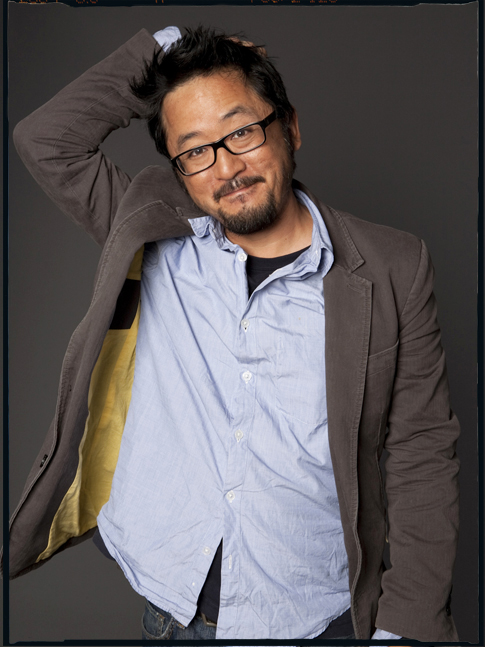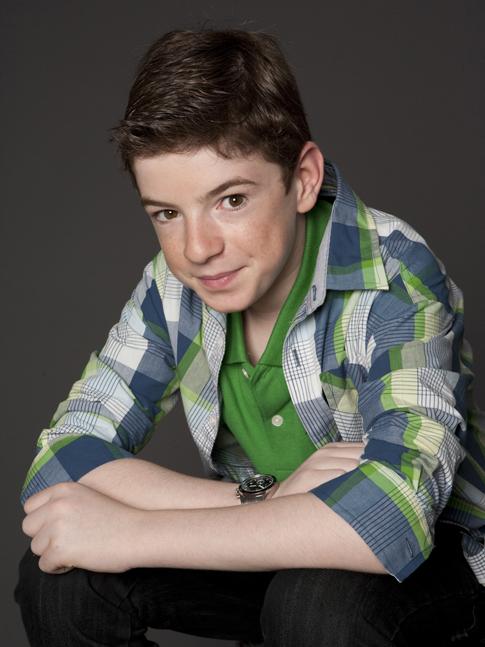
Screenwriter and director Dennis Lee says the title of his new feature film, Jesus Henry Christ was recycled. He first used the name for his 13-minute thesis film made while he was in Columbia University's graduate film program. "It did well," he says modestly. Yes, it did. It won numerous awards.
"I wrote it about a 10-year-old boy genius, then I kept that title and that boy and put them in a completely different context when I wrote this comedy. I couldn't let go of that film name. I mean, who could forget that title?," he laughingly asks the Tribeca Film Festival audience at a late April preview.
Sitting down with Lee at the home studio of photographer Leslie Hassler (my daughter), he tells me he used to teach middle school and learned a lot about young kids. Now he writes about them. Besides the boy, this film also features a girl, 12. I ask how, at this early film-making stage, he's achieved the good fortune of directing his own feature films. (This wasn't his first.)
I've been really, really fortunate. Part of it is, of course, you make your own luck, but you work really hard. You don't get to direct that often. A prolific director gets to direct one film a year or one every two or three years. So you write. You can always sit down at a table and write. You can produce scripts and hope that one day, one of them will be turned into a film.
I give my scripts out, but only to people I know will read them. I entered this one in the Tribeca All Access Program in 2005. I was fortunate enough to win the Creative Promise Award - their screenwriting award.

Dennis Lee / Photo by Leslie Hassler
Lady Luck came through in the person of Julia Roberts, who'd starred in another film he'd written and directed, Fireflies in the Garden. She called Lee saying she'd read his JHC script, liked it, and they should talk. She became the executive producer, and her production company, Red Om Films, produced the film.
With Roberts behind him, Lee landed two sought-after stars for his film: Michael Sheen (Frost/Nixon, The Queen) and Toni Collette (Little Miss Sunshine, Showtime's United States of Tara). But this film wasn't offering big bucks. Someone in the film audience asked Lee what it took to get Michael Sheen. "Let's just say that the salary would buy a new Honda," he said.
Sheen's character in JHC diverges sharply from his recent roles. His youthful clean-shaven look is transformed by a beard, black hair, and glasses. He's barely recognizable playing Dr. Slavkin O'Hara, a supposedly smart professor of behavioral sciences whose behavior is ridiculously dumb. Caring more for professional recognition than parenting a happy child, he has treated his young daughter Audrey (Samantha Weinstein) like a lab experiment. He raises her without a hint of gender bias, trying to prove that however she turns out, gay or not, one's sexuality is genetic. As a result, 12-yr old Audrey is angry, friendless, and not certain who she is, even if she's a girl. This is played for laughs, as are Sheen's career-driven professor and Collette's hapless mother.
Is Jesus Henry Christ an expletive? Someone's name? It's a bit of both. A 10-yr old boy named Henry (Jason Spevack) is born to a loving, leftist, feminist single mom, Patricia Herman (Collette). While sometimes morose, she's devoted to motherhood. When Henry begins speaking full sentences at nine months, she wants no publicity for her boy genius. With a video-graphic memory, he's heading for college by age 10. As he's repeatedly heard the phrase "Jesus H. Christ" uttered by agitated relatives, he wonders if the "H" doesn't stand for his name, Henry. Growing agitated himself over not having a father, he fixates on learning his father's identity. His mother fears telling him he's a test tube baby.

Jason Spevack, "Henry" / Photo by Leslie Hassler
The turning point comes when Henry's grandfather Stan (played hilariously by Frank Moore) tells him the truth -- that he was conceived in a petri dish -- and says he's discovered Henry has a half sister. It's Audrey O'Hara, the professor's daughter. The search for Henry's holy grail is on, and he uses his intellect to solve the riddles surrounding his biological father and his half-sister. More comical characters and machinations build up speed to the climax, a mighty storm that blows the ill winds of secrecy away, revealing a family.
Everyone is wacky except Henry, who maintains a cool focus during what turns out to be the merging of two families. How does Lee sum up his his film? "It's quirky. It goes in some weird places. It's about dysfunctional people who are trying to learn to be functional. And by the end, when the curtain literally closes, I think people can leave the theater feeling these people are going to be all right. The film has a lot of heart."
To see more of Leslie Hassler's photographs, see www.lesliehassler.com